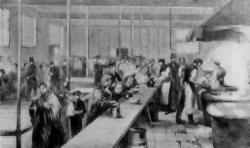John Huntingdon, a grinder, was the spokesman for the operatives and after the dispute had ended the 'Masters' would not employ him. He emigrated from Preston to America and discovered oil on his land, his company eventually became Standard Oil (Esso) and he became one of the richest men in America.
Seven years after the capitulation of the workers in the Great Lockout the cotton industry was again brought to its knees, this time by the 'Cotton Famine'. The Cotton Famine of 1861-5, was partly caused by the American Civil War, when the Northern states blockaded the Southern ports, preventing the export of raw cotton. At the height of the depression, in 1862, a total of 22,500 unemployed people in Preston received outdoor relief. The majority of the inhabitants suffered extreme hardship.
 |
In Preston between one-quarter and one-third of the population was officially classed as destitute. Soup kitchens such as these were a lifeline for the starving families of the town. |